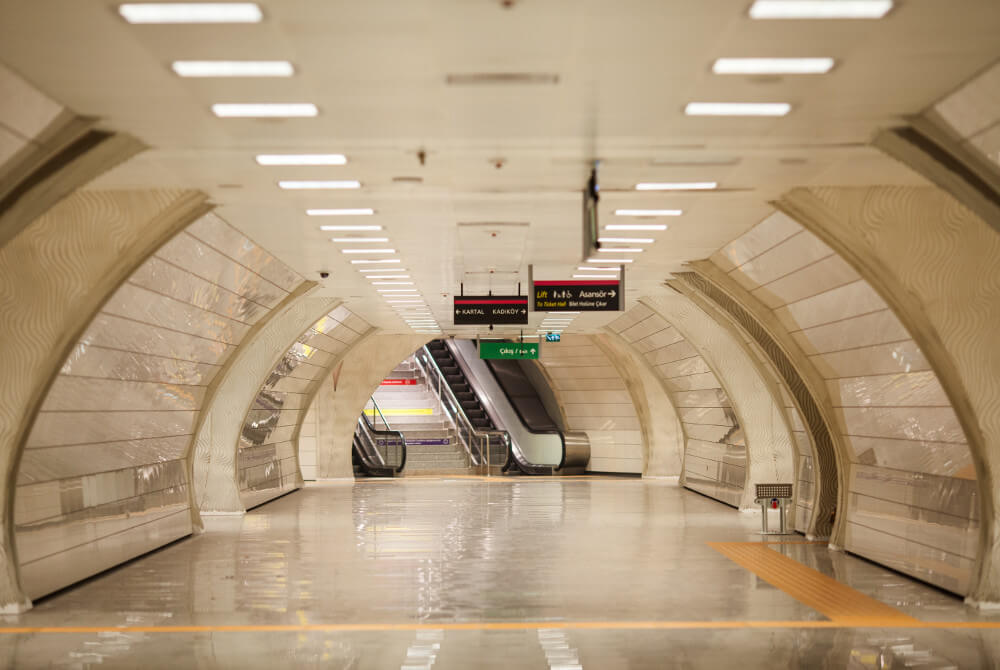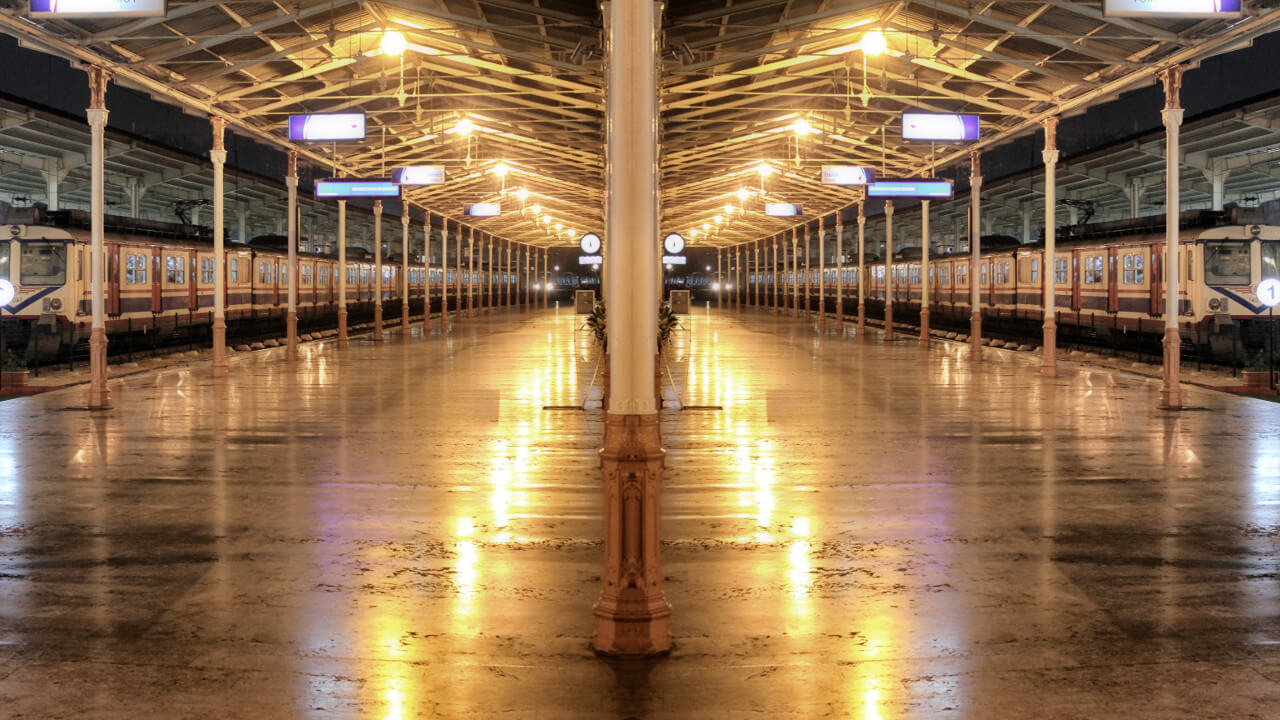Metro Istanbul – The route network
The Turkish metropolis of 15 million inhabitants on the Bosporus also has a well-developed metro system, which has been in operation since 1989. In fact, Turkey’s capital has had a metro since 1875, making the Istanbul Metro Map the second oldest route map in the world. However, the “Tünel” installation, which is still in operation today, is merely an underground funicular railroad that bridges a distance of just 606 meters.
The modern metro network in Istanbul, on the other hand, currently covers a length of 95.7 kilometers, with around 100 additional kilometers in the construction or planning phase. The six lines M1A, M1B, M2, M3, M4 and M6 currently serve 72 subway stations throughout the city, ensuring that over 1.1 million passengers can travel comfortably from A to B every day. On the route map, the Istanbul Metro Map, the individual lines can be distinguished from other means of transport such as the suburban railroad (B) or streetcar (T) not only by the letter “M” in front of them, but also by a uniform color scheme.
The Istanbul metro lines at a glance
- M1A (Yenikapi ↔ Atatürk Havalimani)
- M1B (Yenikapi ↔ Kirazli)
- M2 (Yenikapi ↔ Haciosman)
- M3 (Kirazli ↔ Metrokent)
- M4 (Kadıköy ↔ Kartal)
- M6 (Levent ↔ Rumeli Hisarüstü)
Information for tourists about the Istanbul Metro
Istanbul, a city of millions, is one of the world’s booming metropolitan areas. It is no wonder that the city, which straddles two continents, attracts tourists from all over the world as well as highly qualified workers. Every year, 11 million travelers alone visit the cultural link between the Occident and Orient to marvel at sights such as the Hagia Sophia, the Blue Mosque, the Topkapi Palace and the Galata Tower.
It is obvious that due to the increasing number of guests, more and more people have to deal with the fare system, the timetable and the Istanbul Metro Map. Fortunately, both are straightforward in Istanbul, making it easy even for non-residents to find out how much a metro ticket to their desired destination costs in Istanbul.
Metro Istanbul: Tickets & Prices
In order to avoid confusion right from the start, Istanbul’s three municipal transport companies (İstanbul Otobüs AŞ, Istanbul Ulasim and IETT) rely on a standardized ticket and fare system. In Istanbul, however, they do not rely on classic paper tickets, but on so-called tokens, i.e. tokens.
These tokens must be purchased before the start of the journey at the machines located near the turnstiles that give access to the subway platforms. A special feature here is the uniform fare, as a single journey is simply charged with a token, which currently has an equivalent value of 5 TL (Turkish lira).
The price for a single journey is currently around EUR 1.14, regardless of how long the journey takes. However, if you want to change trains or take a break, you have to pay again when using these “one-way tickets”. As an alternative to one-way tickets, tickets for two, three or even ten people can also be purchased at the machines, whereby the tokens are cheaper thanks to a corresponding discount system.
The so-called Akbill Pass, which is available for a deposit at the customer centers of the transport companies, is also becoming increasingly popular in the Istanbul metro. The Akbill Pass is a chip-based electronic billing system that is particularly suitable for frequent travelers such as commuters thanks to attractive graduated discounts. There is also the “Istanbulkart”, which can be used for public transportation throughout the city.
This also applies to the motorboats and catamarans that cross the Bosphorus. The card, which is also of interest to tourists, is available at Atatürk Airport as well as at all major bus and train stations for a deposit of 10 TL and is used to abolish cash transactions on public transportation. Once the card has been topped up at a machine or by a counter employee, it can be used for contactless payment in the subway.
The most important metro tickets in Istanbul
| Ticket | Prices | Buy a ticket |
|---|---|---|
| Single ride (Jeton) | 5 TL | available on-site |
| 2 rides ticket (Jeton) | 8 TL | available on-site |
| 3 rides ticket (Jeton) | 11 TL | available on-site |
| 5 rides ticket (Jeton) | 17 TL | available on-site |
| 10 rides ticket (Jeton) | 32 TL | available on-site |
| Single ride (Istanbul Card) | 2.30 TL | available on-site |
| Monthly ticket | 205 TL | available on-site |
In Istanbul, a metro ticket does not have to be validated separately, as payment is contactless via Istanbulkart or with the help of previously purchased tokens. The latter are thrown into the slot of the turnstile barriers located at the entrance to the subway platforms.
Electronic tickets, on the other hand, only need to be held up to the sensor provided for this purpose for the fare to be debited. Fare dodging is therefore not even possible in Istanbul and definitely not necessary due to the low costs, especially for tourists.
Subway timetable in Istanbul
The metro schedule in Istanbul provides for operating hours from around 6 a.m. to midnight both during the week and at weekends. The only exception is the M1A line between the city center and the airport, which runs until 1 a.m. The standard frequency has been set at 10 minutes by Istanbul’s transport planners, although the frequency is reduced slightly on many lines at night. At peak times between 7:00 and 9:00 a.m. and between 5:00 and 7:00 p.m., the timetable runs every 4-5 minutes, especially on the busiest routes, in order to cope with the high volume of passengers. This particularly affects the M4, which connects the European part of the city with the Asian part.
To the timetables of the Istanbul metro lines:
As Istanbul’s public transport operators have also planned the metro timetable without continuous night-time services at weekends, night owls have to use other means of transport such as cabs or the metro bus. The seven Metrobus lines, which are often referred to as “Metrobüs” on the timetables, also run at night between 1 a.m. and 5:15 a.m. with a frequency of 10 to 30 minutes, depending on the line.
Further information about the metro in Istanbul
Safety is very important in the Istanbul subway. This can be seen on the one hand in the access barriers to the subway platforms, which are also common in Japan, and on the other hand in the baggage controls. Travelers should therefore not be surprised if they are stopped when passing through the turnstiles so that bags and backpacks can be x-rayed.
As the current metro network is no longer sufficient for Istanbul, two new lines have been under construction since 2012 (M4) and 2014 (M7). In the future, these are intended to equalize traffic in the city center and connect the growing suburbs. There is also the planned construction of the M8 line, which will connect Bakırköy-İncirli station with the Küçükçekmece S-Bahn station north of the airport via 17 stations.





